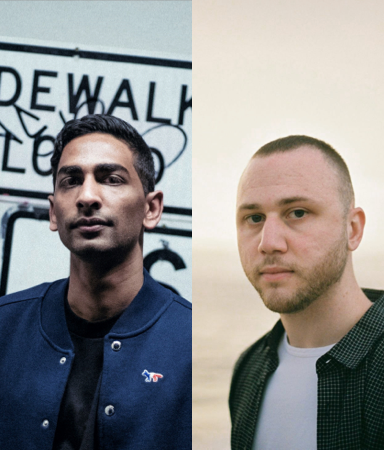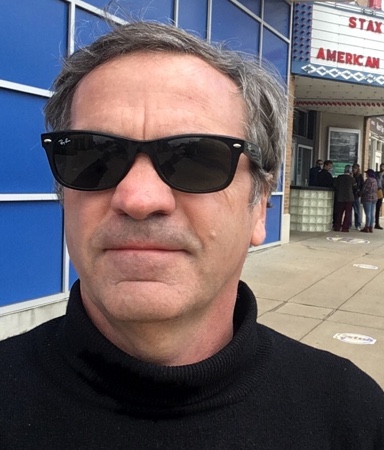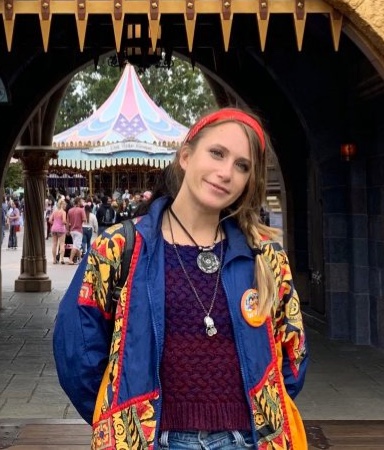Where are you based?
I grew up around Cairns and Kuranda (Far North Queensland) in Australia, but I’ve kind of been stuck in Brisbane for a while now. Although, in better times I spend a few months a year in Osaka, Japan, where I’ve lived off and on since the early 2000s. I also like to spend as much time in the US as I can.
Where do you work? What do you do?
I’ve been working mostly from home as an independent consultant for the last few years. I have some super interesting clients, but definitely miss taking the show on the road at times as well.
What do I do? It’s complicated 😉 But I’m extremely passionate about independence and autonomy in data and music business practices. I spent most of my life as a musician, and after doing a degree quite late in life, accidently did a doctorate on transparency, copyright and metadata (while spending a decade working at music tech companies). Under that broader narrative, I’ve been working with artist managers, tech companies, labels, publishers, start-ups, venture capitalists etc. I also work on projects involving data management, royalty reporting systems, business intelligence, neighbouring rights, data analytics and all manner of other licensing and data applications. I’ve advised on things like blockchain agitation papers and DAOs, worked on federal government funded research projects, and generally driven high level collaborations between industry and research. I also collect vintage Japanese guitars and still play a little music every now and then.
What are you listening to?
My listening preferences really depend on where I am and what I’m doing. If I’m writing or needing to focus on work, I’m listening to fairly generic ambient chill lists or some instrumental funk/soul/afrobeats if I need a little post-lunch ‘kick’. In the car it’s all coming from CarPlay and I’m testing voice recognition with super weird utterances and phrases mostly related to 90s indie rock and hip-hop. My work things generally dictate that I listen to a broad range of styles and genres from obscure to mainstream. The biggest listening trigger for me is authenticity though. Music has to convey some kind of authenticity (even super kitsch/abstract kinds) to hold my attention. A lot more for me to go “wow”. Every now and then some music will give me happy tears though – and this is what I live for.
How do you discover new music?
In better times I try to see as many live shows as possible. I’ve also spent much of the last decade working for out-of-home streaming services and sometimes feel like I’m at work whenever I step into a retail outlet or bar/club and there is music playing. I’m always listening, ‘shazaming’, and/or synching playlists/tracks from venues that have a compatible B2B supplier. There are quite a few background music suppliers that share their playlists by matching the metadata to the major streaming services via API. Once you log in (and give away some data) you can look through/download playlists, see more detailed artist information, make selections, upvote etc. all depending on the service. It’s a great shame the Music Modernization Act didn’t cover the out of home market as well though. A great opportunity lost to reframe any venue as a music store regardless of its type in the US. But I guess SoundExhange provides a way of doing this with limited interactivity (and at the cost of writers not being paid for mechanicals).
When I have some downtime, I have this hobby of programming my various streaming service algorithms by putting super eclectic songs in a long playlist and then running it on an old phone overnight. This kind of randomizes my Daily Mix suggestions and such in interesting ways. I’m also very consciously thinking about which data points are being used to achieve this as I do it. I’ve found some super interesting music this way though, both catalogue and new releases. I also like to play with Chartmetric fields and see what’s happening with particular genres, drill down on editorial adds etc. and just generally be a data voyeur.
In much of my previous work I would quality assure servicing and metadata, so would generally see what was coming in under a range of formats from a near global catalogue. This could vary from doing quality assurance on DDEX feeds, spreadsheets with dropbox links etc. to labels sending me their whole catalogue as giant boxes of CD’s (and everything in-between). I’m also a member of Facebook groups like Now Playing (which emphasises sharing photos of physical copies of recordings) and this exposes me to a lot of more obscure catalogs. Also, my friends – that’s where I get my weirdest and most treasured new music.
What formats do you usually listen to? LP, CD, Cassette, Digital, Streaming Services? Why?
I mostly listen to streaming/digital services to be honest. I do still have some obscure hometown bands on CD, and a box of cassettes from the desk of the community arts centre concerts I worked at in the early 90s. This is a little treasure trove of nostalgia for me. I actually wrote my honours dissertation on the cultural differences between analogue and digital consumption. I’m a big analogue fan, but the whole end-to-end signal path (recording and listening) has to be analogue (for me) otherwise it totally defeats the digital/analogue differentiation. Converting analogue to digital then back to analogue just isn’t the same thing. The restrictions of analogue recording processes saw a lot more emphasis on performing as well, so it’s not just a fidelity thing for me, it’s also about a sense of ‘liveness’ and ‘performance’ in analogue recordings. You only get limited takes before tape degrades, so there’s less multitracking etc. and more ‘humanity’ to me. As much as I love and prefer analogue for these reasons (and see vinyl as replacing CD’s at gigs as “food on the table” merch these days), most of my listening is digital, and mostly streaming.
Where do you do most of your music listening?
Per my comments on ‘what’ I listen to, it really is contextual for me and about where I’m listening as to what I’m listening to. When working on my own I’ve got some trusty headphones that really put me in the right place with the music wherever I am. I just can’t work hearing lyrics though, it’s a thing I have, I get distracted.
I run CarPlay in all my cars and am always throwing weird phrases/utterances to see what playlists/artists come up. I’m also probably happier than I should be that Apple finally made it easier not to have to speak “play xyz song on xyz service” recently. It really was a massive pain having to specify Spotify, Apple Music etc. I listen to a fair bit of music while driving – and always check mixes on car stereos, but that’s a very 90s habit.
I’ve got some vintage gear in my music studio, and still really love the old 80s slab amps (Onkyo, NAD etc.) with some super nice speakers. My teenage kids all have fairly decent Bluetooth speakers and they use them in various ways under a family account so this always interests (and suitably irritates) me. I’ve got old Bose systems scattered around my house with a network of old Airport Express units so I can create multiple zones etc. It’s a decent compromise between old and new. If I’m serious about listening to a recording, I’ve got some decent reference monitors I like to sit in front of.
How do you find and listen to pre-release music?
I spent years doing quality assurance on new releases and embargo tags from DDEX feeds, music servicing companies, promo teams, labels and publishers etc. I also watch release campaigns super closely as part of my broader work life imbalance. Other times it’s music that has been released somewhere obscure and I’m imagining a better team behind it, so although it’s released in a way, it’s content that’s not really been professionally released – per se. I do send some pre-released content around at times, but really want this to be able to be secure and trackable so that the impact of this sharing can be looked at post release i.e. who is getting you into the eyes and ears of your increasing audience. You don’t want it out on any unofficial channels really either – so closing that loop is priceless.
“I do send some pre-released content around at times, but really want this to be able to be secure and trackable”
What are your frustrations with listening to music digitally? Any benefits?
My doctoral thesis pretty much sums this up in far too many words.
The biggest thing for me with the digital marketplace is making sure that everyone gets paid if and when money is on the table. If there isn’t any money on the table, I like to ask around a little as well. I think freemium services have largely replaced piracy, so I understand the programmatic advertising side. I often get weirded out when I’m being targeted by certain advertisers though, especially if they are close to things I have talked about, but not searched for or typed into a search engine. YouTube has really upped the ads recently with mostly double at the front of monetized content most times , but this will drive me to pay for access so I guess it’s better for the creators to be sharing this revenue.
Legacy multi-territory licensing does annoy me on digital platforms though (i.e. having a web of deals per territory instead of consistent global distribution). I work with so many companies and artists that have different catalogs available in different regions (and too much greyed out in different regions), so sharing links with people overseas can be a pain at times. It also creates additional layers in tracking and auditing revenue tbh. In these times we really should have a functional global licensing system that means content isn’t bottlenecked in particular regions for particular uses. I also feel that creators should get paid a lot quicker than they do. Most digital platforms can account monthly, and it would be good to see things like mechanicals and performance rights being paid out monthly for digital services. 30 Days after the end of month should be plenty of time. If writers rely on the reciprocal agreements with reproduction/performing rights organisations it can take months, and often years to pass through. Live streaming, and having to license for each territory really exposed some weaknesses in these systems. Especially the inability to cache (time shift) content for audiences because it’s technically a synchronization. We need global solutions and the technology is there – it’s just a matter of everyone genuinely working together on such things.
Above all, I believe there should be a LOT more transparency surrounding the way digital content is shared and used. The old ways are falling apart slowly, but I’m super interested in how fungible and nonfungible tokens might reshape and automate much of the content licensing marketplace. To be fair, creator equity was probably worse in the physical era… but one can always hope things will improve. I’ve been working on some really interesting WEB3/MUSIC3 projects recently, and above all else, the digital future remains a bright one.
How do you keep track of everything you are listening to?
Much of my work has been about designing and implementing revenue tracking systems for digital services, so this is kind of my thing. I’ve also been involved in play data ingestion projects that looked at what music content was being played across a range of services, and the ways in which this data can be archived and protected as a cultural snapshot.
Sometimes I use data connectors so I can visualize my streaming history. You can also do some fancy things if you enrich this data with other endpoints (Echo Nest, Music Story etc.). I look at things like which label or record company might be trending, or if there are a whole bunch of record companies that I seem to favour – which is a thing with me at times. I can also log into event logs and do things like geomap plays for clients under a range of criteria (label, publisher, artist, revenue pool, performance tariff etc.). I once built a chart at work that showed how much revenue each business development staff member generated for artists each month. They had different territories and each venue had different playlists so their personal charts matched this in interesting ways. I’m a complete data geek, so I’m always thinking about how digital products might benefit communities in terms of music usage analytics.
Do you tip other people off to new music? How?
If I hear something that just grabs me in the feels I definitely share it with the right people if I can. I usually put some context around it though, like looking up certain numbers (or most of them via Chartmetric) or looking at YouTube videos of live shows (if I can’t check them out easily) and making quite targeted suggestions. This could be towards labels/distributors if acts are unsigned, publishing administrators if they don’t appear to be published, other bands/management if they aren’t represented or look like they would be great on a bill with a similar act. Technically, I usually use whichever format the act seems to have the best audience on. Spotify links, Youtube videos, Bandcamp or wherever they seem to be building their community.
Anything you want to “promote”?
The last song/performance that gave me goosebumps is a band called King Stingray who are largely the children of the iconic Australian first nations act Yothu Yindi. They absolutely smashed it on Australian National broadcaster JJJ performing their song Get Me Out (Of the City) – which to me feels like a call back to my own homelands of Far North Queensland. With tinges of Yothu Yindi, strong hints Midnight Oil and acts like The War on Drugs, Bright Eyes, Holy Holy etc. these guys absolutely rock:
In terms of clients etc.
MODA DAO is a WEB3/MUSIC3 project I’m quite lucky to be working on, and with an amazing team of thought leaders https://www.modadao.io
This project is really pushing some interesting boundaries and there has never been a better time to get deep into DAO’s (Digital Autonomous Organizations) and WEB3/MUSIC3 think tanks. Some of the team are also behind https://emanate.live – a powerful collaboration, distribution and real-time payments platform, also blockchain based.
I’m also super excited to have been working on some projects with Onelove Music Group this year. Especially looking at the incredible data story building behind Shouse and their sleeper hit ‘Love Tonight”:
Such a great story about a group of humble humans storming up the international charts some 5 years after the initial release…
A credit to the amazing A&R work of Ant Celestino, and again to Frank Cotela’s long standing support of local music.
I’ve also just wrapped up some special projects for Ingrooves/UMG with my good friend and data affinado Phil Morgan from Metabetta: https://metabetta.com
Apart from that, My DM’s are generally open if anyone would like to know more 😉




